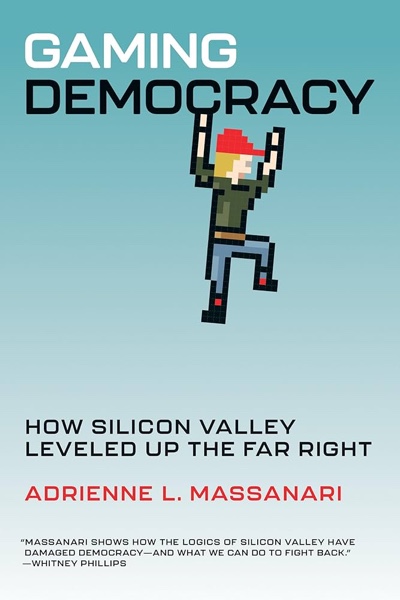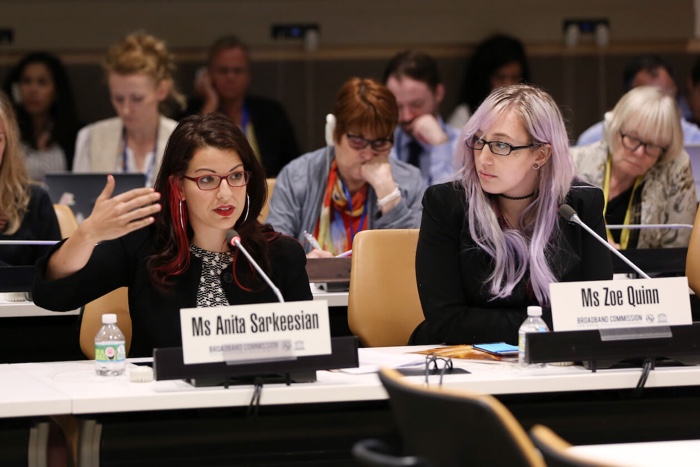
Gaming Democracy. How Silicon Valley Leveled Up the Far Right, by Adrienne L. Massanari, Associate Professor in the School of Communication at American University. Published by MIT Press
Gaming Democracy explores how the algorithmic logics and design politics of social media platforms have amplified the corrosive discourse of the alt-right to the point that these same platforms now seem to act increasingly against democratic institutions. Massanari explains how (mostly anonymous) coordinated groups are exploiting social media and Silicon Valley’s free speech absolutism to disseminate disinformation, weaponise the lack of adequate moderation and pollute conversations in a way that can easily be dismissed as a form of online play.
The author’s thesis is that when extremist groups realised that they could game platforms and technology, they started applying their usual playful forms of discourse (such as memes) to manipulate and ultimately sabotage democracy. Unfortunately, their intolerant ideas, rhetoric and tactics have now seeped into mainstream conservative programmes (in particular the U.S. Republican party but also other right-wing political groups internationally).
Gamergate targets Anita Sarkeesian and Zoe Quinn at the new UN Broadband Commission report on cyber-violence against women and girls. Photograph: UN Women/Ryan Brown, via The Walrus
The book charts the ascendance of the alt-right’s hold on social media and politics, taking three case studies from the past 10 years to illustrate how these communities are using technology to metagame democracy.
The first case study is Gamergate, a misogynistic online harassment campaign motivated by a right-wing backlash against feminism, diversity and progressivism in video game culture. As the movement grew, far-right political actors (such as Steve Bannon) helped shift its impetus away from consumer revolt and toward a populist movement driven by nostalgia for a particular raced and gendered gamer identity. The second case study is the Donglegate, an online shaming operation against a Black female video game developer who had the audacity to complain against lewd jokes made by male peers. Massanari compares her story with the one of a White former Google engineer who wrote an anti-memo to show how Silicon Valley treats individuals who do not correspond to a specific kind of racialised and gendered understanding of the geek figure. The third case study is r/The_Donald, a now banned subreddit where participants, aka “patriots”, used memes, lingua franca, intolerant discourse and strict refusal to allow any meaningful debate to push forward misogynist, bigoted and racist ideas.
If Gaming Democracy. How Silicon Valley Leveled Up the Far Right did not make me collapse and despair, it is because Massanari remains hopeful. She believes it is not too late to reclaim a more inclusive and just digital future.
She wants more responsibility from the triple-A gaming industry, which is not only transmitting a very narrow, hyper-masculinised vision of what winning means but is also sorely lacking in meaningful involvement of women and marginalised individuals in design and development roles. More responsibility from a press that tends to provide the public with very little insight about how technologies reflect the values of their creators. More responsibility from the tech industry which meritocratic ideology and cult of the nerd masculinity undermine women, people of colour and other marginalised communities. She also blasts technologists’ refusal to consider how their platforms might be used for harassment purposes and antidemocratic ends.
Massanari adds that we have some leverage too. We can lobby legislative bodies to demand greater accountability from social media companies and push for better laws regulating data privacy and revenge porn. It is particularly urgent now that the focus has turned to artificial intelligence. She has a few words to praise the EU’s attempt to reign in the tech industry, which feels good at a time when the consensus is to lambast the EU because they do no spend enough money in developing a European ChatGPT or DeepSeek. The book is very US-centric. But very few things that happen in the USA do not affect the rest of the world. Reading Gaming Democracy made me think of Matteo Salvini, Santiago Abascal and other poisonous MEGA figures who are also using social media and social media users to advance nationalist, xenophobic, misogynist and transphobic ideas.
This book was published in October 2024. At the time, Massanari considered that “maybe we’ve finally realized that we can’t look to Silicon Valley and people like Elon Musk (who until relatively recently was celebrated by the geeks hanging out on Reddit) for solutions to our problems. Maybe we can finally question their “Move fast and break things” mentality and the belief that the tech billionaires are somehow better equipped to fix these problems than the rest of us are. Maybe we can persuade Congress and governments globally to regulate technology companies.” That statement is even more appropriate in February 2025 than it was at the time of the book writing. In fact, much of the content of Gaming Democracy is still valid today. In fact, much of it is essential reading if we want to extract society from this hot mess, we need to understand how we got into it.





 – Kelly Lacey & Love Books Tours
– Kelly Lacey & Love Books Tours



